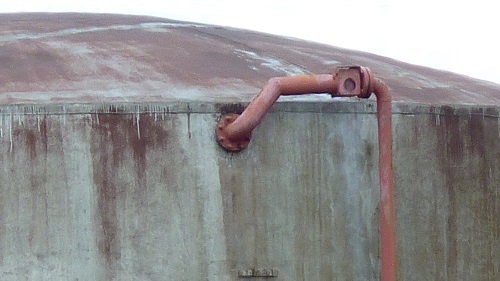
Groggy and still winking from jet-lag, the chair of the plane was stifling in the air traveling west over the Atlantic. The scratchy speakers interrupted with the captain’s voice announcing heavy turbulence. I had the noisy sensation of a jerky ride. Three days at the Energy Crisis Convention in Berlin had left me exhausted. Buckled in and dozing off into lucid dreaming, I saw myself lurking over the newsstand in the “press quarter” along Koch Street. The headlines of The Local read “Petroleum Man in the Pits.” “Barrel of Light Oil Reaches 45 thousand Yen.” It is the year 2025 and the effects of peak cheap oil along with obsessive reliance on fossil fuel have brought the agro-industrial apparatus to a grinding halt.
Years of erosion to the top soil due to intense mechanical plowing, monocultures and the spread of transgenic seeds, now threaten our chances to survive.
Restoring denatured soils, woodlands and forests will take generations.
I could still hear the keynote speaker’s opening remark:
“To replace the current agro-industrial food production we would need the equivalent of 22 billion humans working around the clock.”
Can you imagine the magnitude of this glitch?
The energy necessary to produce industrial farming must be replaced with efficient low
energy systems. Low energy systems follow the inherent design of natural ecologies. Modern studies have determined that with very little labor well-designed woodlands can yield plenty of food. In low energy systems, one acre can easily sustain ten people. Re-ruralization will reunite us with a much kinder two horsepower system.
My eyes scrolled down the page and kept reading; “Berlin’s Guerrilla Gardeners Losing Ground to Gentrification.”
In the Kreuzberg district, a larger group of urban gardeners including the better known Prinzessinnengarten comprise a community of gardeners that rescued empty lots and
abandoned plots, transforming dead spaces into treasure garden landscape and horticulture. The official pilot project was launched in 2009 by the Nomadic Green group. This community has also experimented with mobile gardens. Mobile gardeners grow stuff in shopping trolley carts and moving bales. This method has been very successful and has allowed some residents to grow their own meal on the go. This is the kind of new social entrepreneurs we need in every city and we must follow their examples.
The sky was covered with gray clouds, almost 200 people, gardeners, friends, fans, activists and gathered neighbors outside the crisis convention hotel. The picket line protested vigorously against the real estate take over. A wooden sign that read “Stop Greed” almost scathed my
forehead; “we are currently being threatened by shortsighted urban developers. Garden plots are facing eviction charges” shouted one angry protester. Blinking in rapid sequence, I wondered if I had had this dream again and again. Far away as if from another dimension, I could hear a
polite voice: “Please sir, put on your seat belt.” I could almost swear the busty stewardess leaned over and handed me the newspaper as she whispered: “Is this yours.” Urban gardeners are more than subsistence farmers they are forward thinkers implementing their ideas with success.
Glancing back at the tabloid I could not tell if I was still dreaming or awake, the date on the margin read May 28 of 2011. Still traveling west, backward in time, traditional roles of the city landscape began to change, all I could see out the windows was the mirror of social evolution, a pitched tapestry of ochre Atlantic coated vastness. If we had no more petroleum, the pumps would stop; cities would starve in a matter of days amidst rioting mayhem.
The woman with the megaphone vehemently shouted:
“I propose that we support and sponsor urban gardeners. We must begin to tap into the
potential of vertical and roof gardens, and water collection as well as sustainable energy off grid technology in a well-knit hub of districts.”
If guerrilla gardeners sprouted everywhere utilizing every nook and cranny of soil and space, we might spare a chance. This way we could ruralize together with regional and local communities in fulfillment of our life purpose.
Instead of struggling for survival, we will live by the heart, celebrating our universal gifts, like the soil of this planet. When you give you will receive and the Earth has given its body so we may receive her nutrients, like the sacrificial mother, without expecting a return. Our role as gardeners is to tend to this gift in harmony.
I was abruptly awakened by turbulent air. The overweight passenger beside me mumbled in German as he crouched over: “please, möchtest du ausgehen.” The aisle seat can be a nuisance, I reminded myself as I stood tightly almost pressed against his green T-shirt which amazingly read: “Help sprout your new city.”
Will it be possible for us to embrace uncertainty as the ego structures of petroleum man come to a stop? This is a good thing, like living soil; all potential is there, ready to grow.
|
ABOUT THE AUTHOR
Carlos Cuellar Brown is a New York City media artist and essayist who has written on new media, social theory and metaphysics. His essays have been posted online by Opendemocracy, The Global Dispatches, The Pelican Web, Kosmos Journal, and STARDRIVE.
In 2013 his essay “Intermedial Being” was published by A Journal of Performance and Art PAJ #106 MIT Press Journals. In 2015 Mr. Brown was nominated for the TWOTY awards out of the Netherlands for his essay “Blueprint for Change”. He has been a regular columnist for Second Sight Magazine and Fullinsight.
His book, In Search of Singularity: Reflections and Chronicles from the End of Time, published 29 January 2017, is a series of reflections on the current cultural evolution from competition to cooperation, from patriarchy to reciprocity between humanity and the human habitat.
|
|